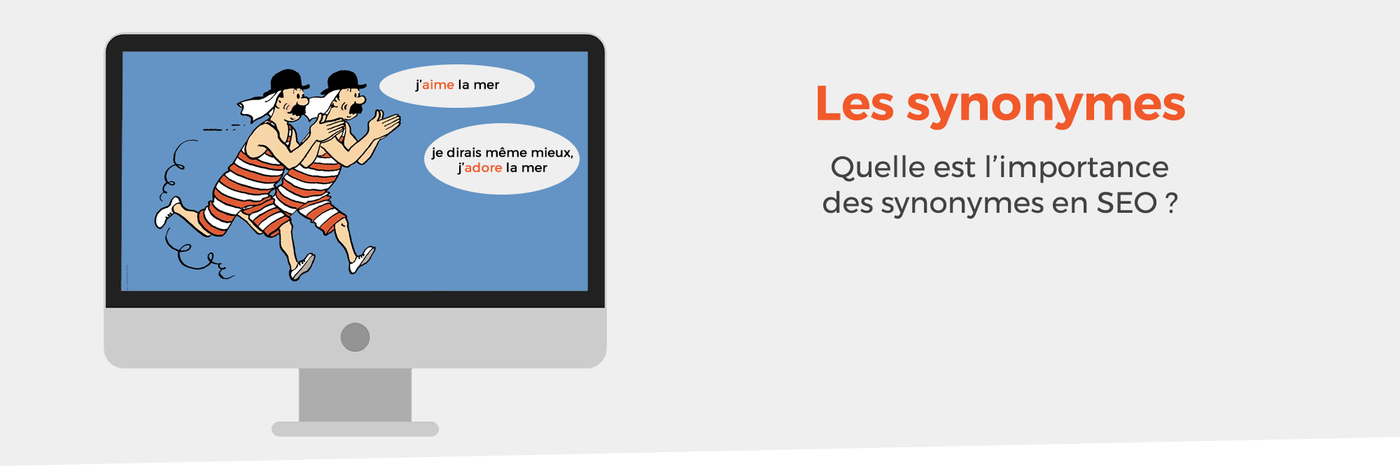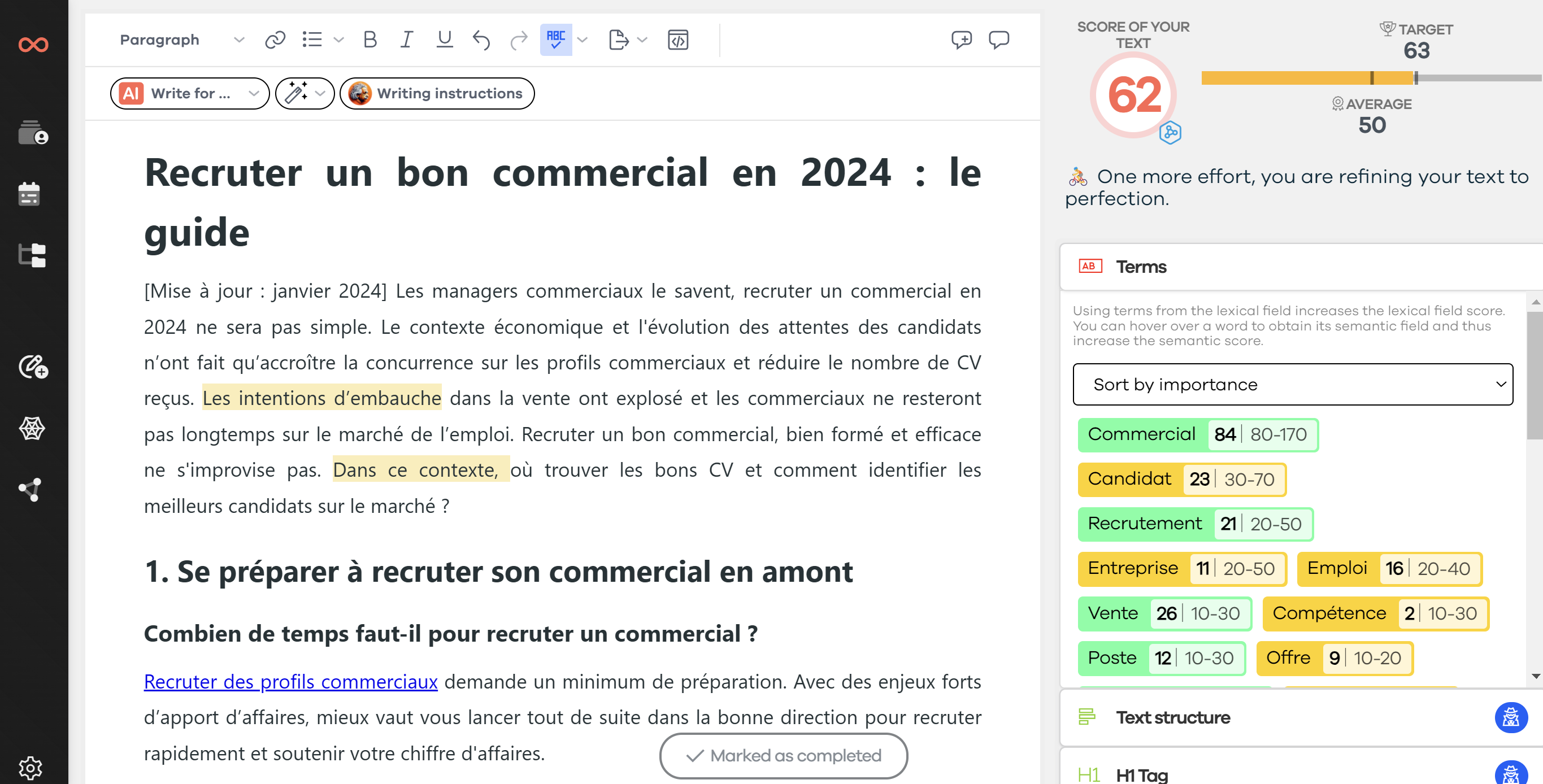By definition, synonyms are words or phrases with an identical meaning. For example, "SEO" is a synonym for "search engine optimization", "organic search", "organic SEO", or "Google SEO". The role of synonyms within an SEO strategy has evolved over the past few years. Indeed, the use of a complete lexical field and a precise semantics has become essential for content optimization.
🚀 Express Reading: What You Will Learn in This Article
- The evolution of search engines in relation to synonyms: from keyword stuffing to adapting to voice queries on the Web.
- 4 steps to optimize the SEO of synonyms:
- List the synonyms.
- Use synonyms for internal linking.
- Add synonyms in the anchors of backlinks.
- Use lemmatization.
🤠 Synonym: The Rastapopoulos of Search Engines?

Are synonyms the enemies of search engines?
A few years ago, search engines had a very literal understanding of keywords. At that time, algorithms were limited and synonyms were not automatically understood. Thus, it was necessary to use the most common synonyms when we wanted the algorithm to take them into account.
SEO experts understood this: using synonyms caused the weakening (dilution phenomenon) of the presence of the main keyword in content creation. Therefore, if you wanted to be referenced on the expression "Tintin comic book", you had to avoid using the keywords "Tintin BD" or "graphic novel". Instead, you had to create a separate page to be able to use a particular variation.
The downside of this system is that the contents seem to be identical. The smartest (and laziest) would use a Content Spinning tool[1] to produce different texts, but overall, the content remained short and of low quality.
The same was true for the anchor texts of backlinks. SEO experts recommended emphasizing the main form of the keyword and using synonyms only very rarely. Nowadays, following this advice would have negative consequences on the SEO of a page and could lead to penalties.
💡 Google Understands Synonyms Today
Over the past few years, search engines have significantly increased their understanding of unstructured textual data[2]. Natural language processing has expanded considerably and several algorithms are capable of understanding words through their context.
By using machine learning models[3] and regularly updating their databases, search engines like Google are able to provide similar search results when queries use a synonym. Even though the positioning of the displayed sites differs slightly, it remains very similar.
Moreover, today, synonym detection is managed by machine learning methods that analyze new documents and new internet pages to improve their synonym detection capability (like word embedding techniques).
That's why you should avoid overusing a keyword. Indeed, using different variations throughout your article will be more effective. These changes in the use of synonyms have improved the quality and readability of publications.
Put yourself in the user's shoes: it is unpleasant to read the same word over and over again. Yet, the excessive use of a term was until recently an effective way to improve the visibility of content in the SERP (search engine results page).
🧠 The Synonym Indispensable in the Answer Engine
Organic search still plays a vital role, but another type of search is evolving in parallel, partly thanks to voice search.
Google, Apple, Amazon, and others are transforming into answer engines. Assistants (Google Home, Siri, Alexa...) dictate an instant response to a search query that they recognize as a trusted authority.
Our vocal style makes our queries more relaxed, and you will hear questions such as, "Siri, what is Tintin's dog's name?" And "Ok Google, why does Tintin have a quiff?". Voice search is more conversational, hence the importance of using synonyms in your content.
🎁 4 Steps to Optimize Your SEO with Synonyms
As synonyms are easily understood by machines, copywriters have struggled to use them in a way that gives an advantage in terms of SEO.
Step 1: Make a List of Synonyms Corresponding to the Main Keyword
Each publication addresses a problem and uses one or two key phrases. As you've probably heard before, focusing on a theme and a main keyword does not mean repeating the same words on every line of text. Make a list of relevant synonyms from the most important keywords.
For example, if you are writing an article on "how the opera singer in Tintin's adventures is named", you can create a list of synonyms from the following words:
- Name — call, designate, entitle
- Opera singer — singer, diva, prima
By combining these few variants, you will get more than a dozen new possibilities! Distribute the synonyms throughout the content and place them where you would place your main keywords.
If your word count is not high enough to allow you to use all the variants and combinations you have found, keep the remaining part for later. Because even though it is now recommended to use synonyms, it is important to emphasize your main keyword. Ideally, this should be placed in the hot zones of SEO, such as the first and last paragraph, the title of the publication, and a subtitle.
Step 2: Add Synonyms to Your Internal Linking Strategy
In addition to your content, Google analyzes your anchor texts to understand the subject of your page. When you create a link, you need to write a text to support it. This text is usually related to the subject of the page. And to some extent, the two linked pages should be similar.
A website is composed of keywords, pages, and links. By using an effective internal linking strategy, you will help Google to map the pages of your site and group them into keyword clusters. Be careful to write your anchor texts well, especially by using different synonyms and linking to thematically relevant pages.
Step 4: Use Synonyms in Backlinks
The backlinks (return links) from other sites pointing to one of your publications should also have an anchor text. Ideally, your main keyword is included and it is accompanied by synonyms. However, when you set up your link building strategy, you should think about varying your anchors, or risk having your site penalized by Google! You could, for example, use this type of variation:
- less than 10 percent for the keyword alone;
- about 30% for the brand name;
- more or less 20% of generic terms ("click here", "learn more", etc.);
- approximately 40% of lexical variants and synonyms.
Natural SEO optimization is primarily based on on-site performance, combined with off-site signals. Backlinks are among the most important off-site signals.
Step 4: Use Lemmatization
In NLP (Natural Language Processing)[4], lemmatization (or stemming in English) consists of bringing a term, regardless of its agreements, its declensions to its simplest form (for French infinitive/masculine-singular).
Here are some examples of lemmatization:
- stumbling, stumbles, stumbled => stumble
- jellyfish, stung, stung (VERB) => sting
Not to be confused with stemming which refers to words that have the same root. "Stemming" a word means removing the inflections and keeping only the radical.
Here is an example of stemming:
- explained, explains, explained, explanation => explain
The idea here is to use this process to transform words and thus avoid using the same form each time. Lemmatization will also allow you to find new publication ideas.
If you are writing a blog post presenting "3 tips for estimating and valuing your Tintin comics", I advise you to stem your main keywords.
In our example from the words "estimate" and "value" we can write the following publication: "What value for your Tintin comics, how to estimate them at the fairest price?".
This will allow you to generate new content ideas.
🎬 Conclusion
The use of synonyms and all the variants allowing to decline your keyword is today essential to improve your SEO. Moreover, I remind you that your readers are human beings and you must prioritize their reading comfort!
1. Choose the most revealing keyword.
2. List its synonyms.
3. Lemmatize and stem each term.
4. Use these declensions in your text.
5. Add links pointing this page on other pages of your site that deal with the same domain and vary the anchors.
6. Do the same when creating backlinks.
7. Repeat on another page 😉
Finally, if you also do paid advertising on search engines (SEA), remember to do the same in your internet ads!
🙏 Sources Used for Writing This Article
[1] https://www.axenet.fr/definition-content-spinning/
[2] https://www.searchenginejournal.com/google-begins-using-neural-matching-to-understand-synonyms-impacting-30-of-queries/271035/
[3] https://arxiv.org/ftp/arxiv/papers/1407/1407.1133.pdf
[4] http://blog.onyme.com/lemmatisation-et-racinisation-en-francais-flexion-lemme-et-racine-dun-mot/
Need to go further?
If you need to delve deeper into the topic, the editorial team recommends the following 5 contents:


